Related Research Articles

A nuclear weapon is an explosive device that derives its destructive force from nuclear reactions, either fission or a combination of fission and fusion reactions, producing a nuclear explosion. Both bomb types release large quantities of energy from relatively small amounts of matter.

The Treaty on the Non-Proliferation of Nuclear Weapons, commonly known as the Non-Proliferation Treaty or NPT, is an international treaty whose objective is to prevent the spread of nuclear weapons and weapons technology, to promote cooperation in the peaceful uses of nuclear energy, and to further the goal of achieving nuclear disarmament and general and complete disarmament. Between 1965 and 1968, the treaty was negotiated by the Eighteen Nation Committee on Disarmament, a United Nations-sponsored organization based in Geneva, Switzerland.

Nuclear disarmament is the act of reducing or eliminating nuclear weapons. Its end state can also be a nuclear-weapons-free world, in which nuclear weapons are completely eliminated. The term denuclearization is also used to describe the process leading to complete nuclear disarmament.

The WC-135 Constant Phoenix is a special-purpose aircraft derived from the Boeing C-135 Stratolifter and used by the United States Air Force. Its mission is to collect samples from the atmosphere for the purpose of detecting and identifying nuclear explosions. It is also informally referred to as the "weather bird" or "the sniffer" by workers on the program and international media respectively.

India possesses nuclear weapons and previously developed chemical weapons. Although India has not released any official statements about the size of its nuclear arsenal, recent estimates suggest that India has 172 nuclear weapons and has produced enough weapons-grade plutonium for up to 200 nuclear weapons. In 1999, India was estimated to have 800 kilograms (1,800 lb) of separated reactor-grade plutonium, with a total amount of 8,300 kilograms (18,300 lb) of civilian plutonium, enough for approximately 1,000 nuclear weapons. India has conducted nuclear weapons tests in a pair of series namely Pokhran I and Pokhran II.
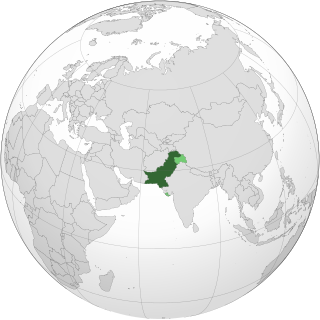
Pakistan is one of nine states that possess nuclear weapons. Pakistan began developing nuclear weapons in January 1972 under Prime Minister Zulfikar Ali Bhutto, who delegated the program to the Chairman of the Pakistan Atomic Energy Commission (PAEC) Munir Ahmad Khan with a commitment to having the device ready by the end of 1976. Since PAEC, which consisted of over twenty laboratories and projects under reactor physicist Munir Ahmad Khan, was falling behind schedule and having considerable difficulty producing fissile material, Abdul Qadeer Khan, a metallurgist working on centrifuge enrichment for Urenco, joined the program at the behest of the Bhutto administration by the end of 1974. Producing fissile material was pivotal to the Kahuta Project's success and thus to Pakistan obtaining the capability to detonate a nuclear weapon by the end of 1984.

Prithvi is a tactical surface-to-surface short-range ballistic missile (SRBM) developed by Defence Research and Development Organisation (DRDO) of India under the Integrated Guided Missile Development Program (IGMDP). It is deployed by India's Strategic Forces Command.
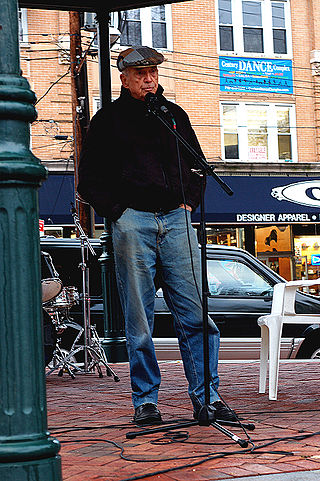
The Plowshares movement is an anti-nuclear weapons and Christian pacifist movement that advocates active resistance to war. The group often practices a form of protest that involves the damaging of weapons and military property. The movement gained notoriety in the early 1980s when several members damaged nuclear warhead nose cones and were subsequently convicted. The name refers to the text of prophet Isaiah who said that swords shall be beaten into plowshares.

Iran is not known to currently possess weapons of mass destruction (WMD) and has signed treaties repudiating the possession of WMD including the Biological Weapons Convention, the Chemical Weapons Convention, and the Non-Proliferation Treaty (NPT). Iran has first-hand knowledge of WMD effects—over 100,000 Iranian troops and civilians were victims of chemical weapons during the 1980s Iran–Iraq War.
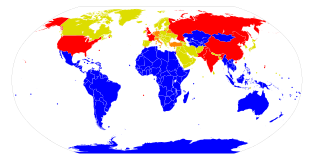
Nuclear sharing is a concept in NATO's policy of nuclear deterrence, which allows member countries without nuclear weapons of their own to participate in the planning for the use of nuclear weapons by NATO. In particular, it provides for involvement of the armed forces of those countries in delivering nuclear weapons in the event of their use.

The United States was the first country to manufacture nuclear weapons and is the only country to have used them in combat, with the bombings of Hiroshima and Nagasaki in World War II against Japan. Before and during the Cold War, it conducted 1,054 nuclear tests, and tested many long-range nuclear weapons delivery systems.
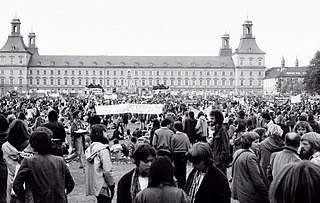
The anti-nuclear movement is a social movement that opposes various nuclear technologies. Some direct action groups, environmental movements, and professional organisations have identified themselves with the movement at the local, national, or international level. Major anti-nuclear groups include Campaign for Nuclear Disarmament, Friends of the Earth, Greenpeace, International Physicians for the Prevention of Nuclear War, Peace Action, Seneca Women's Encampment for a Future of Peace and Justice and the Nuclear Information and Resource Service. The initial objective of the movement was nuclear disarmament, though since the late 1960s opposition has included the use of nuclear power. Many anti-nuclear groups oppose both nuclear power and nuclear weapons. The formation of green parties in the 1970s and 1980s was often a direct result of anti-nuclear politics.

The Institute for Science and International Security (ISIS) is a nonprofit, non-governmental institution to inform the public about "science and policy issues affecting international security". Founded in 1993, the group is led by founder and former United Nations IAEA nuclear inspector David Albright, and has been described as specializing "in analyzing the findings" of the IAEA. ISIS was founded on a belief that scientists have an obligation to participate actively in solving major problems of national and international security. ISIS focuses primarily on four parts: 1) prevent the spread of nuclear weapons and related technology to other nations and terrorists, 2) lead to greater transparency of nuclear activities worldwide, 3) reinforce the international non-proliferation regime, and 4) cut down nuclear arsenals. Furthermore, ISIS seeks to build stable foundations for various efforts to reduce the threat posed by nuclear weapons to U.S. and international security by integrating technical, scientific and policy research. As the effectiveness of ISIS was recognized in the Global “Go-To Think Tanks” rankings, ISIS consistently places in the top 25 Science and Technology Think Tanks in the world and in 2015 placed as one of the top United States and foreign policy think tanks in the world.

Barton David Gellman is an American author and journalist known for his reports on the September 11 attacks, on Dick Cheney's vice presidency, and on the global surveillance disclosure. Beginning in June 2013, he authored The Washington Post's coverage of the U.S. National Security Agency, based on top secret documents provided to him by ex-NSA contractor Edward Snowden. He published a book for Penguin Press on the rise of the surveillance-industrial state in May 2020, and joined the staff of The Atlantic.
In 1984, Prime Minister David Lange banned nuclear-powered or nuclear-armed ships from using New Zealand ports or entering New Zealand waters. Under the New Zealand Nuclear Free Zone, Disarmament, and Arms Control Act 1987, territorial sea, land and airspace of New Zealand became nuclear-free zones. This has since remained a part of New Zealand's foreign policy.

The anti-nuclear movement in the United States consists of more than 80 anti-nuclear groups that oppose nuclear power, nuclear weapons, and/or uranium mining. These have included the Abalone Alliance, Clamshell Alliance, Committee for Nuclear Responsibility, Nevada Desert Experience, Nuclear Information and Resource Service, Physicians for Social Responsibility, Plowshares Movement, United Steelworkers of America (USWA) District 31, Women Strike for Peace, Nukewatch, and Women's International League for Peace and Freedom. Some fringe aspects of the anti-nuclear movement have delayed construction or halted commitments to build some new nuclear plants, and have pressured the Nuclear Regulatory Commission to enforce and strengthen the safety regulations for nuclear power plants. Most groups in the movement focus on nuclear weapons.
Anti-nuclear organizations may oppose uranium mining, nuclear power, and/or nuclear weapons. Anti-nuclear groups have undertaken public protests and acts of civil disobedience which have included occupations of nuclear plant sites. Some of the most influential groups in the anti-nuclear movement have had members who were elite scientists, including several Nobel Laureates and many nuclear physicists.
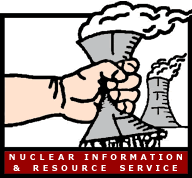
More than 80 anti-nuclear groups are operating, or have operated, in the United States. These include Abalone Alliance, Clamshell Alliance, Greenpeace USA, Institute for Energy and Environmental Research, Musicians United for Safe Energy, Nevada Desert Experience, Nuclear Control Institute, Nuclear Information and Resource Service, Public Citizen Energy Program, Shad Alliance, and the Sierra Club. These are direct action, environmental, health, and public interest organizations who oppose nuclear weapons and/or nuclear power. In 1992, the chairman of the Nuclear Regulatory Commission said that "his agency had been pushed in the right direction on safety issues because of the pleas and protests of nuclear watchdog groups".

Nuclear Tipping Point is a 2010 documentary film produced by the Nuclear Threat Initiative. It features interviews with four American government officials who were in office during the Cold War period, but are now advocating for the elimination of nuclear weapons: Henry Kissinger, George Shultz, Sam Nunn, and William Perry. Michael Douglas narrated the film.

The Bomb is a 2015 American documentary film about the history of nuclear weapons, from theoretical scientific considerations at the very beginning, to their first use on August 6, 1945, to their global political implications in the present day. The film was written and directed by Rushmore DeNooyer for PBS. The project took a year and a half to complete, since much of the film footage and images were only recently declassified by the United States Department of Defense.
References
- ↑ "About 2FP « Two Futures Project". Twofuturesproject.org. Retrieved November 11, 2011.
- ↑ Palmer, Jack. "The Two Futures Project: Who Would Jesus Bomb? | Sojourners: Celebrating 40 Years of Faith in Action for Social Justice". Blog.sojo.net. Archived from the original on October 7, 2011. Retrieved November 11, 2011.
- 1 2 "Washington National Cathedral : Event Detail for Faith and the Future of Nuclear Weapons". Nationalcathedral.org. June 21, 2009. Archived from the original on October 6, 2011. Retrieved November 11, 2011.
- ↑ "Leadership « Two Futures Project". Twofuturesproject.org. Retrieved November 11, 2011.
- ↑ "The Post-Atomic World by Tyler Wigg-Stevenson". Qideas.org. Retrieved November 11, 2011.
- ↑ "A World Without Nuclear Weapons by Tyler Wigg-Stevenson". Qideas.org. Retrieved November 11, 2011.
- ↑ "Two Futures Project by Tyler Wigg-Stevenson". Qideas.org. Archived from the original on November 16, 2011. Retrieved November 11, 2011.
- ↑ "Putting a Face on The Bomb by Tyler Wigg-Stevenson". Qideas.org. Retrieved November 11, 2011.
- ↑ Anonymous (November 1, 2010). "Malone forum to focus on nuclear disarmament – Canton, OH". CantonRep.com. Archived from the original on August 7, 2011. Retrieved November 11, 2011.
- ↑ "Christian leaders celebrate START treaty | Texas Faith Blog | dallasnews.com". Religionblog.dallasnews.com. Retrieved November 11, 2011.
- ↑ "Jonathan Merritt: Evangelicals On Disarmament: A Good START To A Safer World". Huffington Post. June 8, 2010. Retrieved November 11, 2011.
- ↑ "America Magazine One Step Closer for START". Americamagazine.org. September 24, 2010. Retrieved November 11, 2011.
- ↑ Altman, Alex (December 8, 2010). "Why Evangelicals and Catholic Bishops Support New START | Swampland". Time . Retrieved November 11, 2011.
- ↑ "Two Futures Project: Conservative & Progressive Christians | The Episcopal Peace Fellowship". Epfnational.org. April 23, 2010. Archived from the original on August 7, 2011. Retrieved November 11, 2011.
- ↑ "Under God: Church re-enlisting in anti-nuke campaign – David Waters". Newsweek.washingtonpost.com. Archived from the original on April 12, 2010. Retrieved November 11, 2011.
- ↑ "WORLD Magazine | Nuclear posture | Alisa Harris | Apr 07, 10". Worldmag.com. Retrieved November 11, 2011.
- ↑ "Faithful voices vs. nukes: 4-8-10 (Bill's 'Faith Matters' Blog)". Billtammeus.typepad.com. April 8, 2010. Retrieved November 11, 2011.
- ↑ "Jonathan Merritt: Are Christians Key to Anti-Nuke Movement?". Huffington Post. January 4, 2010. Retrieved November 11, 2011.
- ↑ "Associated Baptist Press – Christian leader welcomes new limits on use of nuclear weapons". Abpnews.com. April 6, 2010. Archived from the original on April 10, 2010. Retrieved November 11, 2011.
- ↑ Wigg, Tyler. "Guest Voices: Why conservative Christians should support nuclear abolition - On Faith at washingtonpost.com". Newsweek.washingtonpost.com. Archived from the original on April 17, 2010. Retrieved November 11, 2011.
- ↑ Krattenmaker, Tom (August 22, 2010). "What if the end isn't near?". USA Today. Retrieved November 11, 2011.
- ↑ "Endorsements « Two Futures Project". Twofuturesproject.org. Retrieved November 11, 2011.
- ↑ "Family Research Council". Frc.org. Retrieved November 11, 2011.
- ↑ "Institute on Religion & Democracy". IRD. Archived from the original on October 16, 2011. Retrieved November 11, 2011.